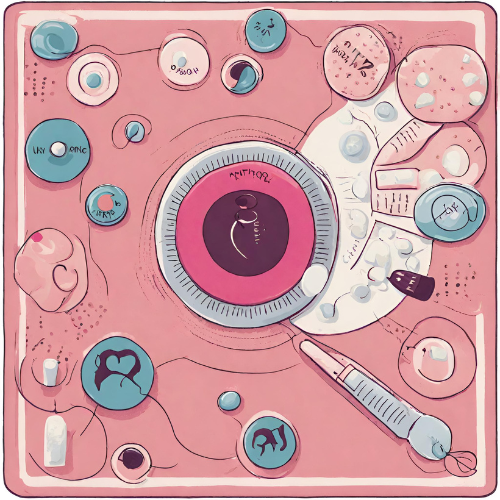Understanding Birth Control: A Comprehensive Guide
Introduction to Birth Control Birth control, also known as contraception, refers to methods or devices used to prevent pregnancy. With various options available, individuals can choose the method that best fits their lifestyle, preferences, and health needs. In this guide, we will explore the different types of birth control, their mechanisms of action, effectiveness, benefits, and considerations.
Types of Birth Control
- Barrier Methods:
- Condoms: Latex or polyurethane sheaths worn over the penis or inserted into the vagina to prevent sperm from reaching the egg.
- Diaphragm: A silicone cup inserted into the vagina to cover the cervix and block sperm from entering the uterus.
- Cervical Cap: Similar to a diaphragm, but smaller and made of silicone, placed over the cervix to prevent sperm from entering the uterus.
- Hormonal Methods:
- Birth Control Pills: Oral contraceptives containing synthetic hormones (estrogen and/or progestin) that prevent ovulation and thicken cervical mucus to block sperm.
- Birth Control Patch: A thin, adhesive patch worn on the skin that releases hormones to prevent ovulation.
- Birth Control Shot: Injectable progestin administered every three months to prevent ovulation and thicken cervical mucus.
- Intrauterine Devices (IUDs):
- Copper IUD: A small, T-shaped device inserted into the uterus that releases copper ions to prevent sperm from fertilizing the egg.
- Hormonal IUD: A small, T-shaped device that releases progestin into the uterus to prevent ovulation and thicken cervical mucus.
- Permanent Methods:
- Tubal Ligation: Surgical procedure to block or seal the fallopian tubes, preventing eggs from reaching the uterus for fertilization.
- Vasectomy: Surgical procedure to cut or block the vas deferens, preventing sperm from being ejaculated during ejaculation.
Mechanisms of Action
- Barrier methods physically block sperm from reaching the egg.
- Hormonal methods prevent ovulation, thicken cervical mucus, and thin the uterine lining to prevent pregnancy.
- IUDs prevent fertilization by affecting sperm motility and viability or inhibiting implantation.
- Permanent methods permanently block the fallopian tubes (tubal ligation) or vas deferens (vasectomy) to prevent pregnancy.
Effectiveness of Birth Control The effectiveness of birth control methods varies:
- Barrier methods: 78-88% effective.
- Hormonal methods: 91-99% effective.
- IUDs: More than 99% effective.
- Permanent methods: Over 99% effective.
Benefits of Birth Control
- Prevents unintended pregnancies.
- Provides control over reproductive choices and family planning.
- Regulates menstrual cycles and reduces menstrual symptoms.
- May reduce the risk of certain health conditions such as ovarian cysts, pelvic inflammatory disease, and endometrial cancer.
- Offers non-contraceptive benefits such as acne reduction, lighter periods, and relief from menstrual cramps.
Considerations for Choosing Birth Control
- Health considerations: Discuss with a healthcare provider to determine the most suitable method based on medical history, lifestyle, and preferences.
- Effectiveness: Consider the effectiveness rate and user compliance of each method.
- Side effects: Be aware of potential side effects such as weight gain, mood changes, and changes in libido.
- Cost: Evaluate the cost of each method, including initial expenses and ongoing maintenance.
- Long-term goals: Consider future fertility desires and the reversibility of birth control methods.
Conclusion Birth control plays a crucial role in family planning and reproductive health, offering individuals the freedom to make informed choices about contraception. With various options available, individuals can select the method that aligns with their preferences, lifestyle, and health needs. By understanding the different types of birth control, their mechanisms of action, effectiveness, benefits, and considerations, individuals can make empowered decisions to protect their reproductive health and achieve their family planning goals. If you have questions or concerns about birth control, consult with a healthcare provider for personalized guidance and support.



